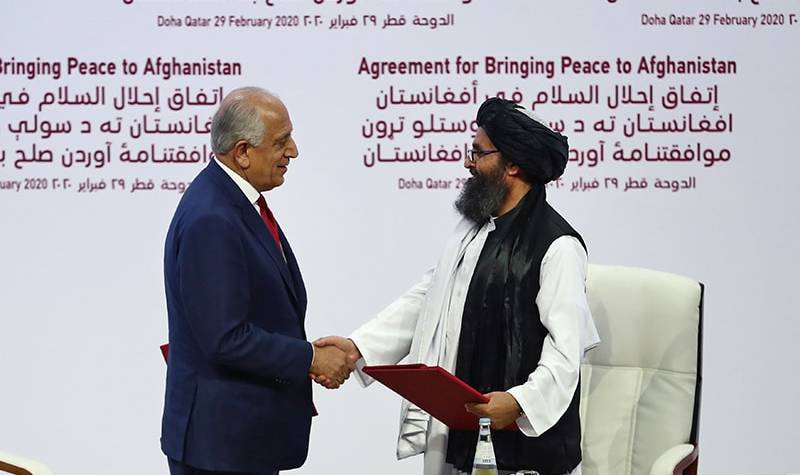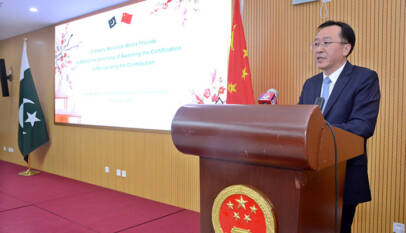Prospects of CPEC under the US-Taliban peace deal
CPEC is an inclusive project that aims to promote regional development, peace and stability. But since the commencement of CPEC, India has been trying to sabotage it. China is keen to include Afghanistan in CPEC while India has conspired to hurt project’s inclusivity by promoting instability in region, mainly in Afghanistan. However, the US and Taliban peace deal recently has turned the scenario in favour of CPEC. To the desire of China and Pakistan, a peaceful and stable Afghanistan is likely to join CPEC and there will be no room for Indian endeavours to damage this mega project.
SINCE its inception in 2015, the China Pakistan Economic Corridor (CPEC) has been threatened by security situation in Afghanistan. Pakistan and China made hectic efforts for taking the Afghan Government on board over this gigantic project. Afghan Government conceivably had no problem, but those driving Kabul regime; India and United States having been resounding Kabul guards not to support CPEC since it runs counter to their strategic interests. The Indian spying network; RAW has been using the Afghan soil for promoting terrorist activities and subversion in various parts of Pakistan. As per arrested Indian spy master, Naval Commander Kulbhushan Jadhav, RAW has dedicated a special branch which aims at subverting and sabotaging the China-Pakistan Economic Corridor.
Besides, it has been training, financing, equipping and abetting the terrorist networks like TTP, MQM and Baloch sub-nationalists in Pakistan. Since 2001, India has been using Afghan soil for bleeding Pakistan internally through low intensity warfare and now through 5th Generation Warfare. Commander Jadhav is a 49-year-old former Indian Naval officer, on deputation to RAW. He was controlling all terrorist activities, sabotage and subversion in Pakistan. He was arrested in 2016 from the province of Balochistan while entering from Pakistan. Being its trainer agency, RAW has been making use of Afghan spying network (NDS) for sabotaging the CPEC and promoting terrorism in Pakistan.
The hatred among Afghanis against Pakistanis is the output of Indian deep involvement in Afghanistan; Afghan governmental affairs, its bureaucracy, its politics, its society and above all in its academic system. Indeed, India is killing ‘two birds with one stone’; promoting hate against Pakistan in Afghan society and its academic system and deriving Afghans away from their traditional Islamic values. Pakistani masses and government still host their Afghan brothers and host over 2.6 million Afghan refugees. Pakistan has always been desirous to include Afghanistan on the gigantic CPEC project. Failure to convince Kabul, it has approached Beijing for taking Afghanistan on board. So far there have been three rounds of talks from the forum of China-Afghanistan-Pakistan Trilateral Foreign Ministers’ Dialogue. The last round of these tri-lateral dialogues took place in September 2019 in Islamabad. Apart from many other issues related to political relationship between three geographical contiguous states, issues related to CPEC, Afghan peace process and wider security cooperation were discussed.
The comprehensive peace agreement signed between Taliban and United States on February 29, 2020 is a major step towards peace in Afghanistan. Peace and stability in Afghanistan will positively contributes towards a larger peace in the region. The Afghan peace will open new vistas of economic opportunities and commercial activities for the region, surrounding this significant country. India has wholeheartedly opposed this deal since its strategists consider that, billions of USD they invested in country for promoting terrorism in neighbouring countries of Afghanistan while making use of its soil will go waste as a result of this deal.
Since CPEC is a regional project beneficial for all adjoining states including Afghanistan and India, therefore let’s evaluate the opportunities arising after the peace deal between Taliban and United States. The peace agreement guarantees non-use of Afghan soil against the security of US and its allies which infer that, it would not be used against Pakistan and CPEC too. India will be repentant if peace prevails in Afghanistan and with a peace there, there will be no space for external spying and terrorists’ networks which have operated to destabilize Pakistan and some other neighbouring states since 2001.
Since there will be complete withdrawal of US and NATO forces from Afghanistan in next 14 months, therefore, Afghanistan will be free to take decision at its own without dictation from elsewhere. It will be free to take part in CPEC and allow access to Central Asian region as an extension of CPEC and execution of long-awaited gas pipelines. Regional countries like Pakistan and China will try to ensure its security through bilateral agreements for strengthening its armed forces and domestic security system. Besides, through intra-Afghan dialogue, the Government and Taliban will ensure end of civil war and unrest prevailing since last two decades. The agreed mechanism of ceasefire between warring factions and likely agreement for a future political roadmap for Afghanistan would pave the way for the durable peace and consensus government in Afghanistan.
The comprehensive peace agreement signed between Taliban and United States has many connotations and interpretations. The most significant inference is that, a non-state actor, Taliban brought the super power on its knees in less than two decades. Today, the Taliban stands as heroes of Afghan struggle with global recognition for their valour, concord and determination. Nevertheless, let’s salute those who stood behind them as strategic planners for their farsightedness, devotion and steadfastness. Despite global opposition and regional antagonism, Pakistan and China are determined to complete the gigantic CPEC project. Rather there has been successful completion of phase-I of the project. Pak Army CPEC Security Division has made sure that, all regional and global conspiracies against this strategic project meet miscarriage. The past and contemporary super powers must understand that, it is not 1971. Today, the security of Pakistan is impregnable and the armed forces of Pakistan stand much higher in their professionalism, competence and determination to meet the challenges of modern warfare.
Experts say Pakistan needs stable policies to fully utilize China’s expertise in clean energy and industrial development
Pakistan’s energy sector investments are on a complex trajectory. Despite government effor…













